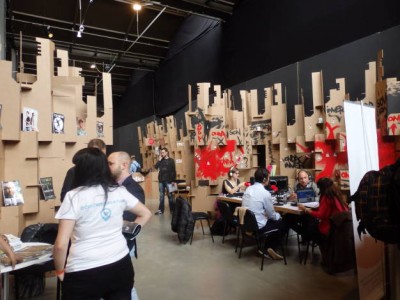MADRID, SPAIN. For Spanish businesses, growth abroad has been a central focus during the economic downturn. In 2013, for the first time, Spain’s trade balance achieved a surplus. Making the leap towards internationalization, however, can be difficult, especially for small and medium enterprises (SMEs), or pequeñas y medianas empresas (PyMEs) in Spanish.
Marta Dalmau and Javier Martínez, of ICEX, the Spanish Institute for Foreign Trade, addressed these challenges at the recent Zinc Shower event, a meeting-show to promote and develop the creative and cultural industries. In a session titled ‘Iniciación a la internacionalización e instrumentos de apoyo’ (Introduction to internationalisation and means of support), the ICEX representatives explained how Spanish SMEs could promote themselves in an international market.

Companies exhibit at Zinc Shower
Specifically, Dalmau and Martínez detailed the prerequisites of ICEX Next, a 24-month program addressing the challenges of expaning abroad outside the EU and into today’s priority markets, including China, Japan and the USA.
In order to participate in ICEX Next, the business must be domiciled in Spain, have been registered for at least 3 years and must not have more than 30% of its annual turnover coming from export. To date, 900 SMEs are already involved in ICEX’s programme.
Dalmau and Martinez explained that methods of support come in two forms: (1) support inside Spain, and (2) support outside Spain. Within Spain, companies meet with ICEX to analyse their business model and their digital marketing campaigns. Dalmau stressed that a useable and trustworthy webpage is key in ensuring a customer base abroad, as it will often give the first impression of a company. Following these analyses, the company, along with ICEX, will then create an international business plan. As part of the ICEX Next Club, participating businesses will also have access to exclusive services, activities and training, such as seminars and webinars, as well as access to documentation on sectors and foreign markets in the form of economic reviews.
Outside Spain, according to Martinez, the heart of ICEX is promotion. ICEX has nearly 100 offices abroad. This support cannot be underestimated, as it reduces travel, and therefore cost, for participating companies, since the local offices are able to deal with issues abroad through meetings with clients. ICEX Next participants are also able to take part in more than 30 exhibitions and trade fairs abroad. Though this does come at a cost of several hundred euros, not excluding travel costs, despite receiving a significant discount.
ICEX Next also provides financial support, with the company and ICEX each financing 50% of costs of consultation and of expanding abroad in terms of promotion, up to a maximum of nearly €13,000 over the two years. Even if a company is able to raise the maximum of €13,000 for the program, further questions arise after the 24 months have passed. If, by then, a company has not been successful abroad, its financial situation could possibly be worse than before.
These reasons have led start-up owners to think twice about participating in ICEX Next. José Antonio Espinosa, Director of IT company Digimate, and one of the exhibitors at this year’s Zinc Shower, continues to rely on his own resources to expand abroad. His company Digimate launched BiblioEteca, a digital library network that also allows readers and writers to interact with one another. The project currently has a presence in all of Latin America, however volume of activity is low. The product is completely virtual, so Espinosa states that external offices are not necessary, allowing contact to be maintained with Latin America without further investment.
When asked if ICEX Next is something Digimate would be interested in for future projects, Espinosa explained, “Further internationalisation is our desire, but until we demonstrate that our business model works in Spain, and due to current lack of funds, we don’t yet dare to launch ourselves into it.”

